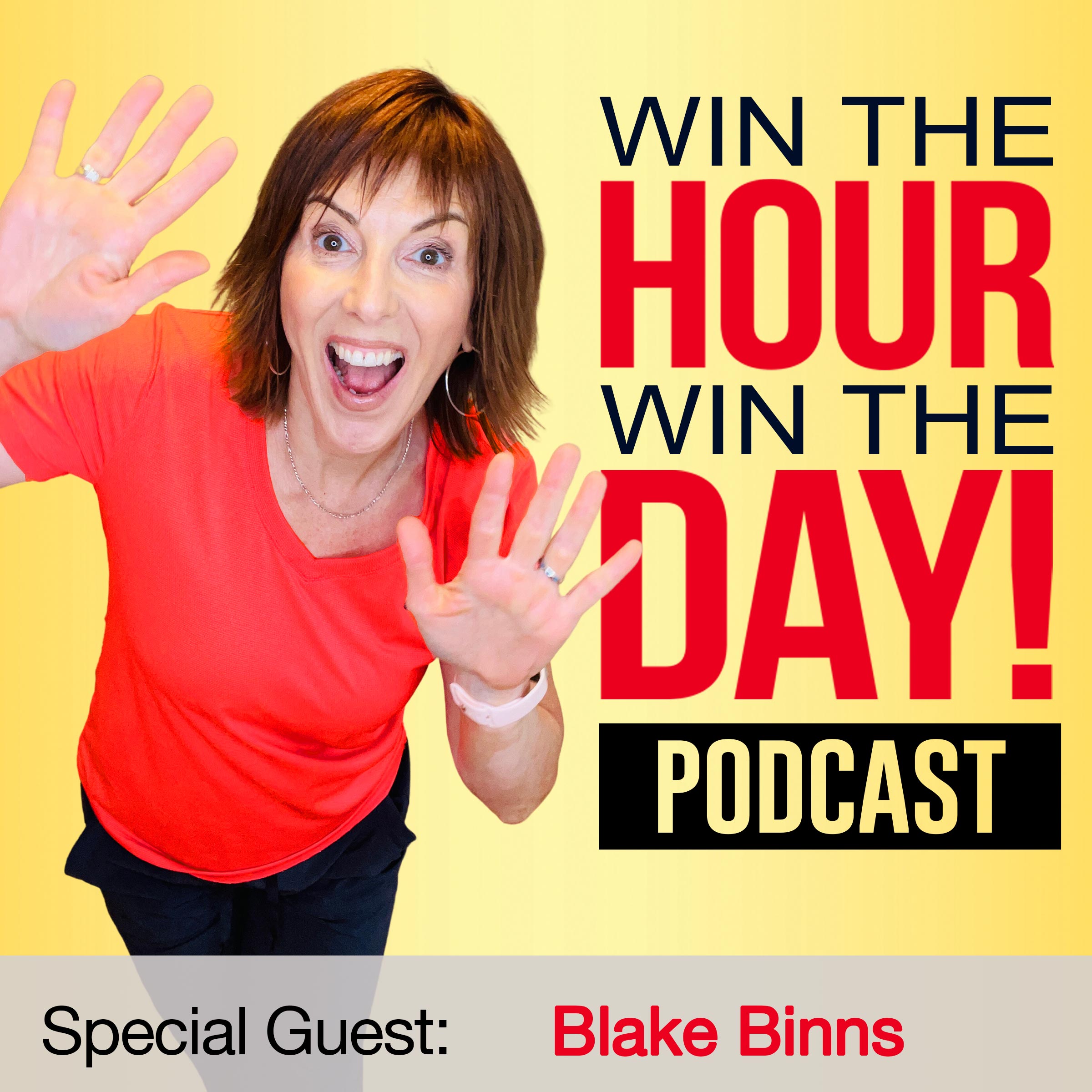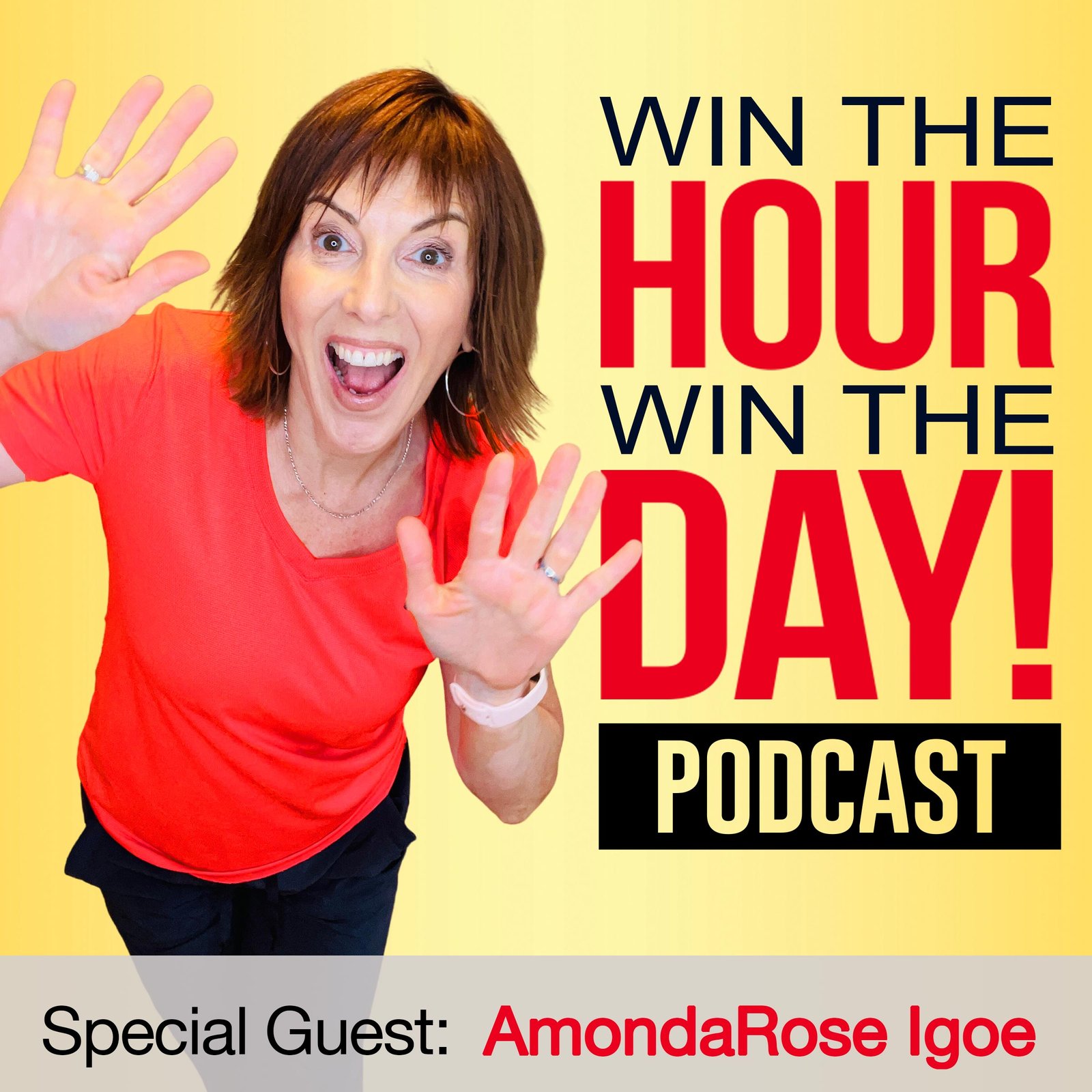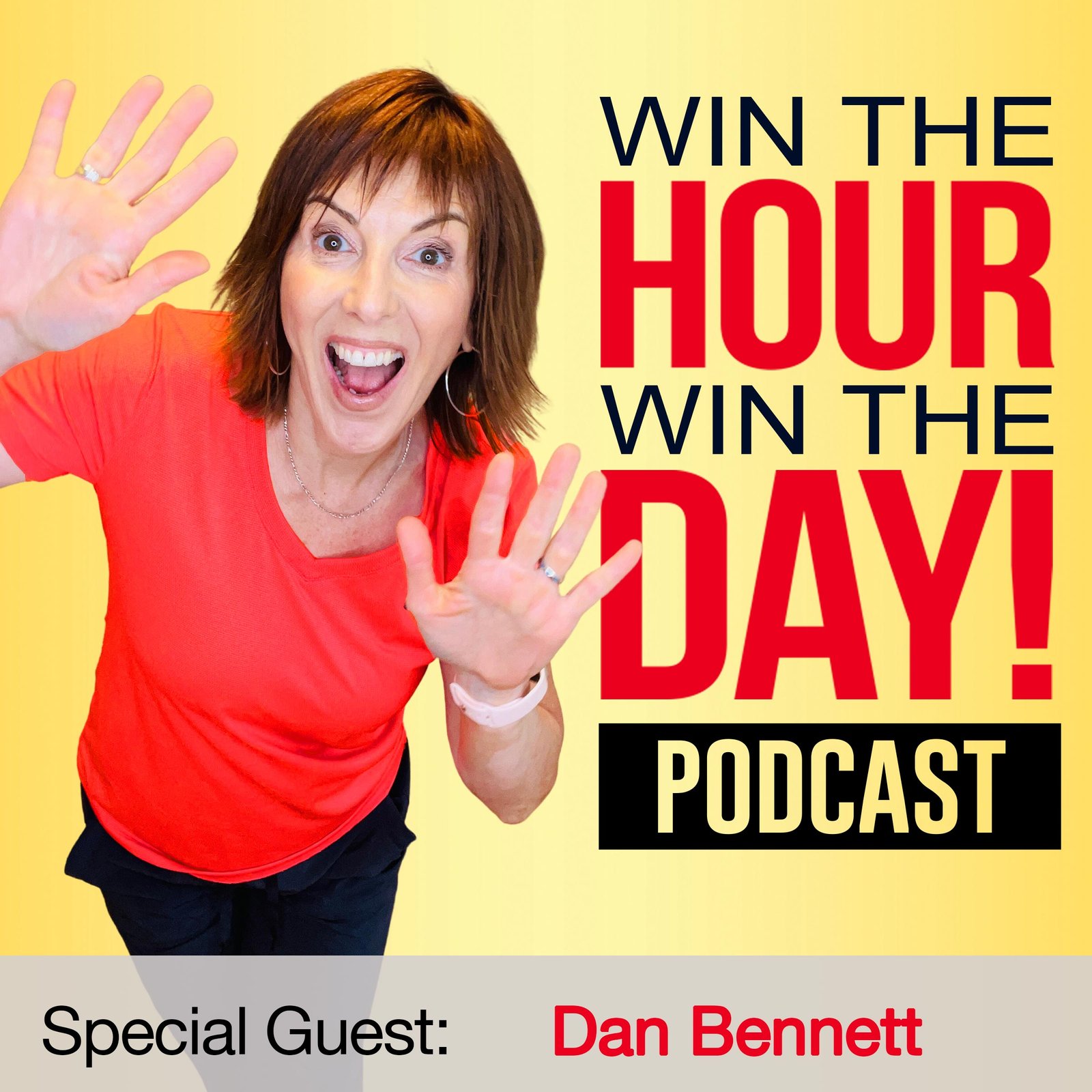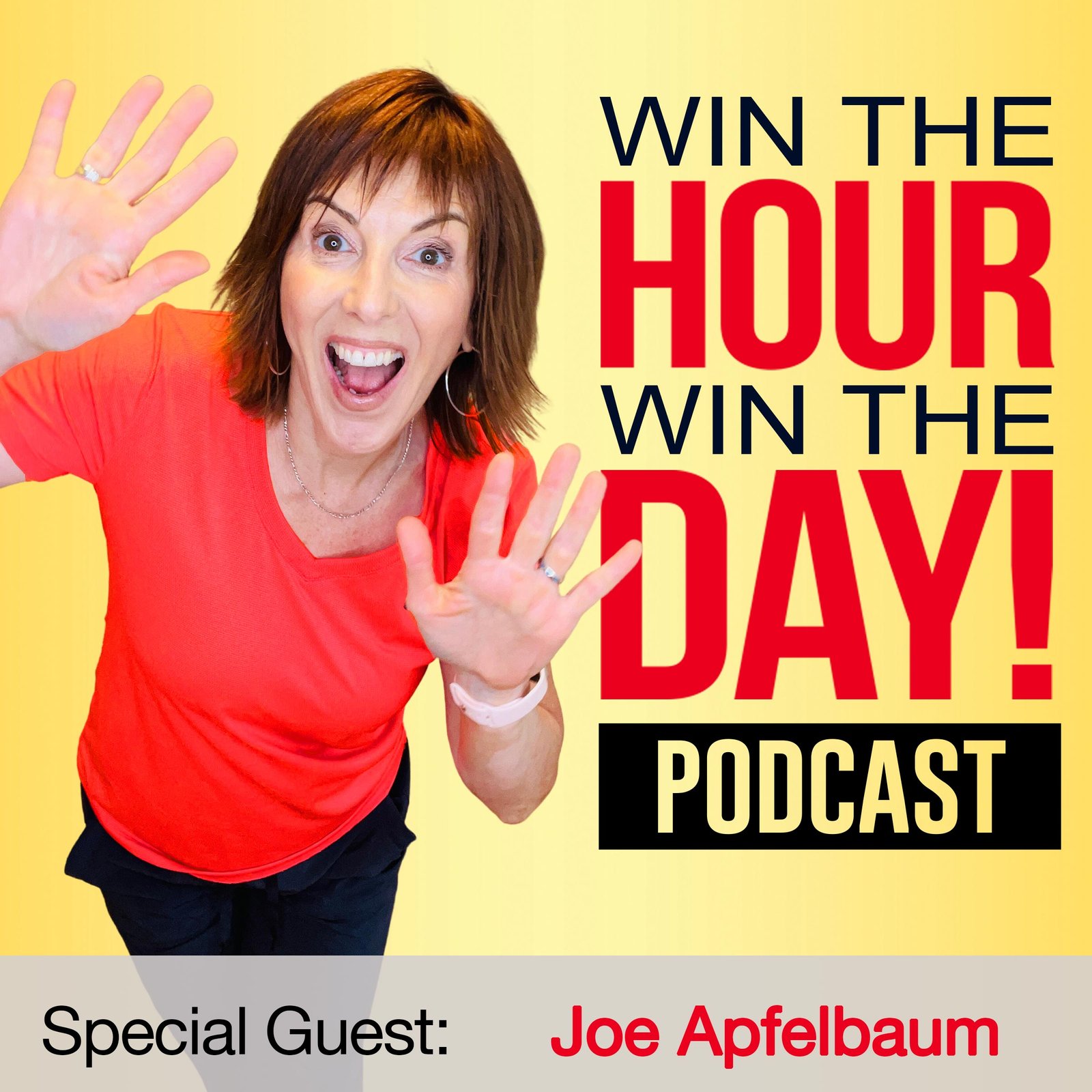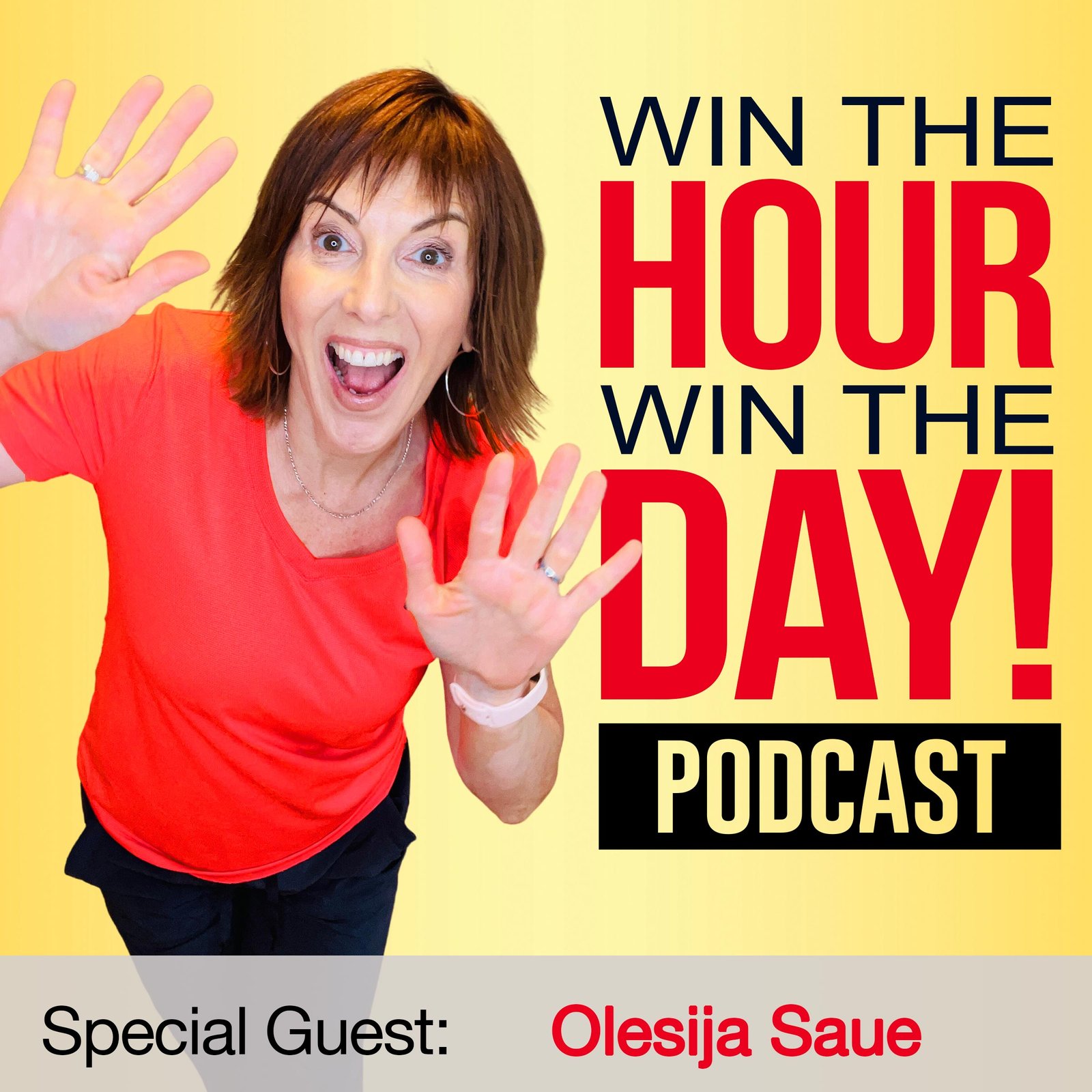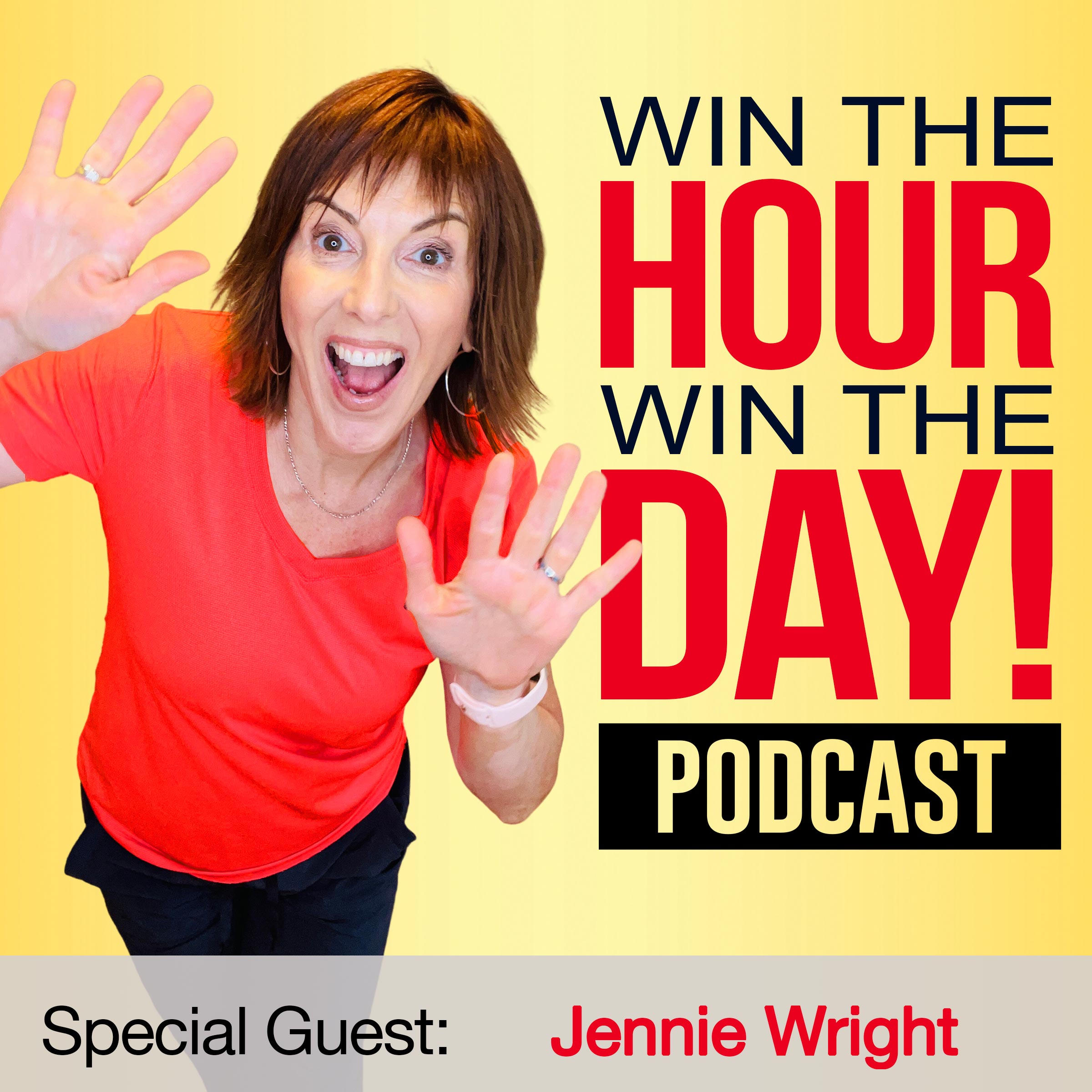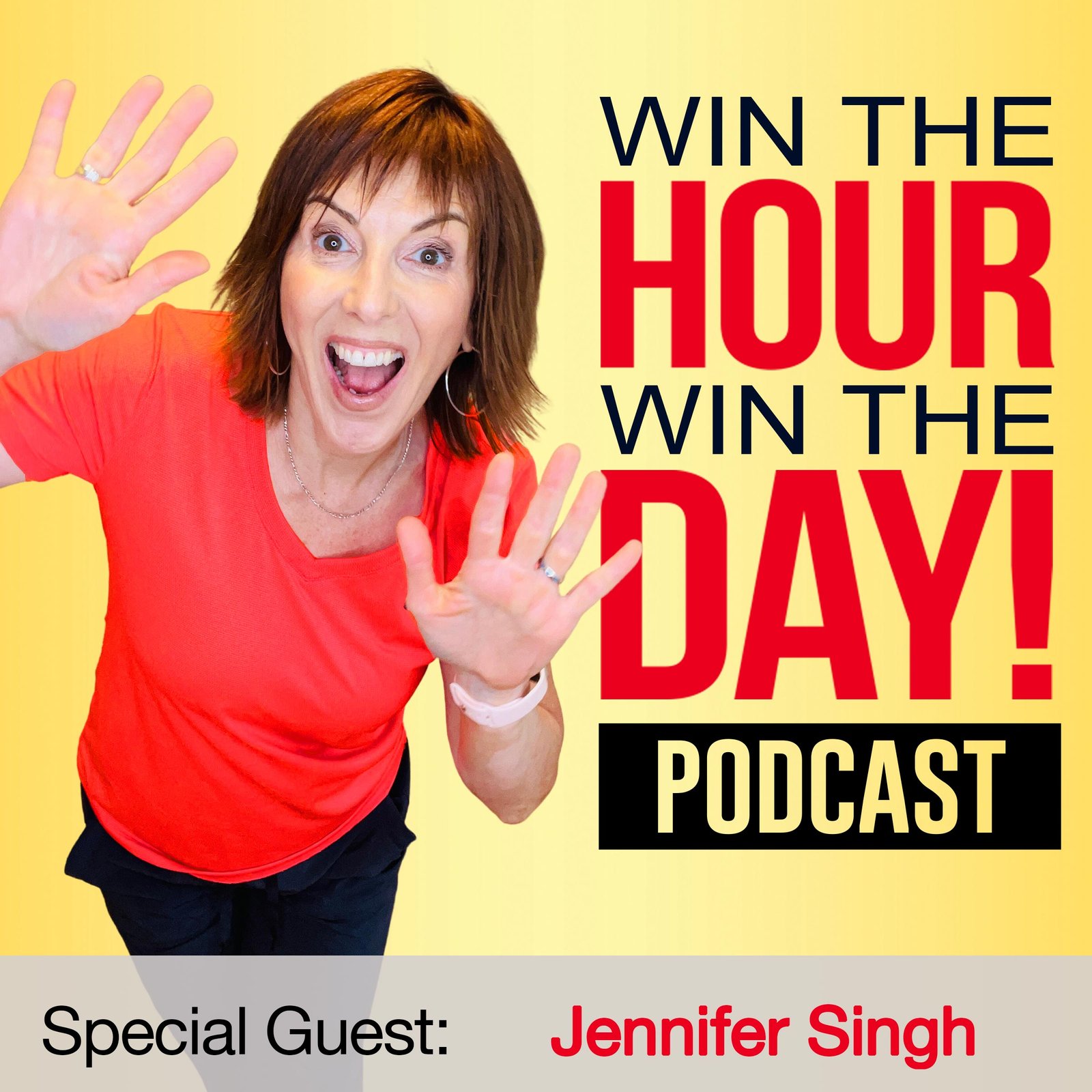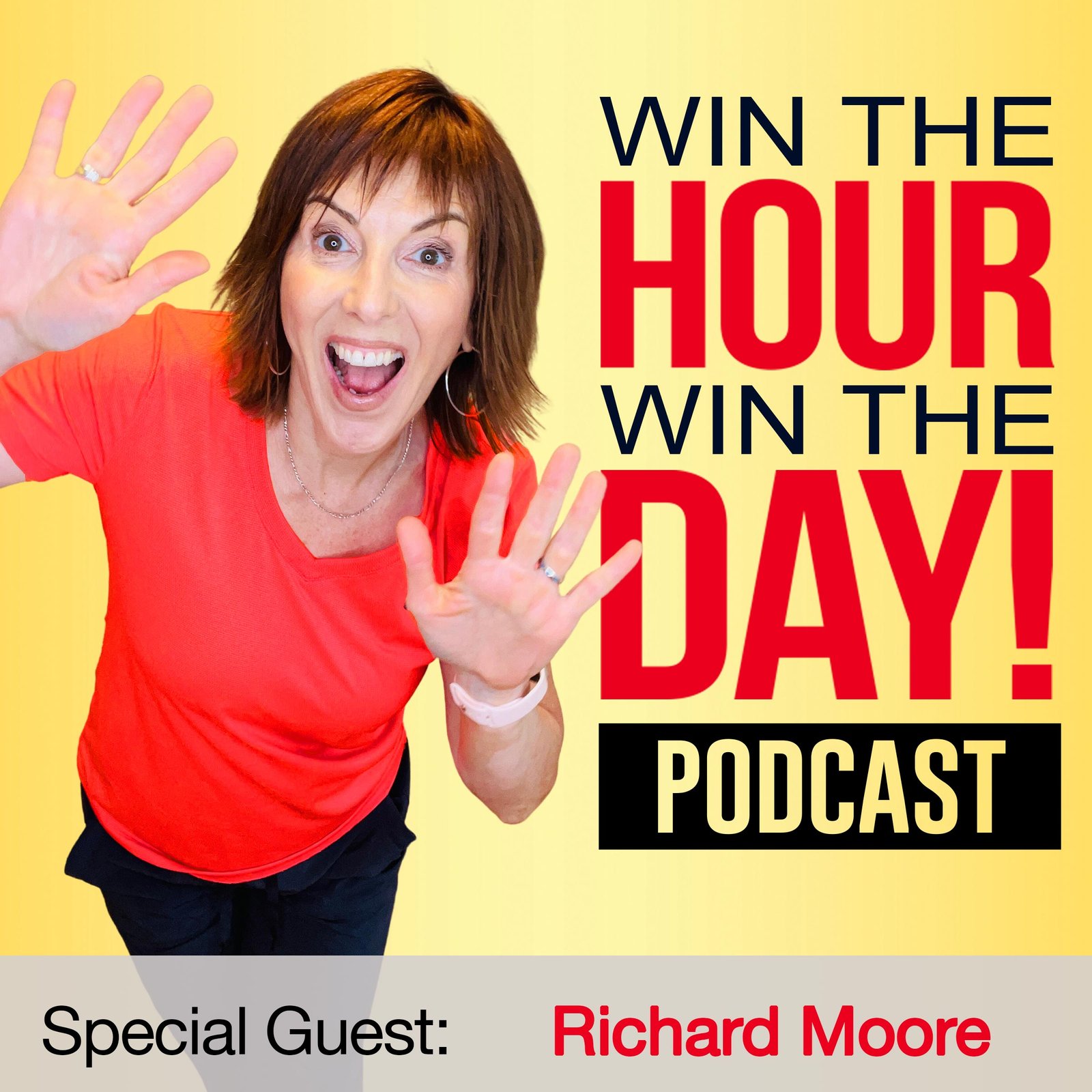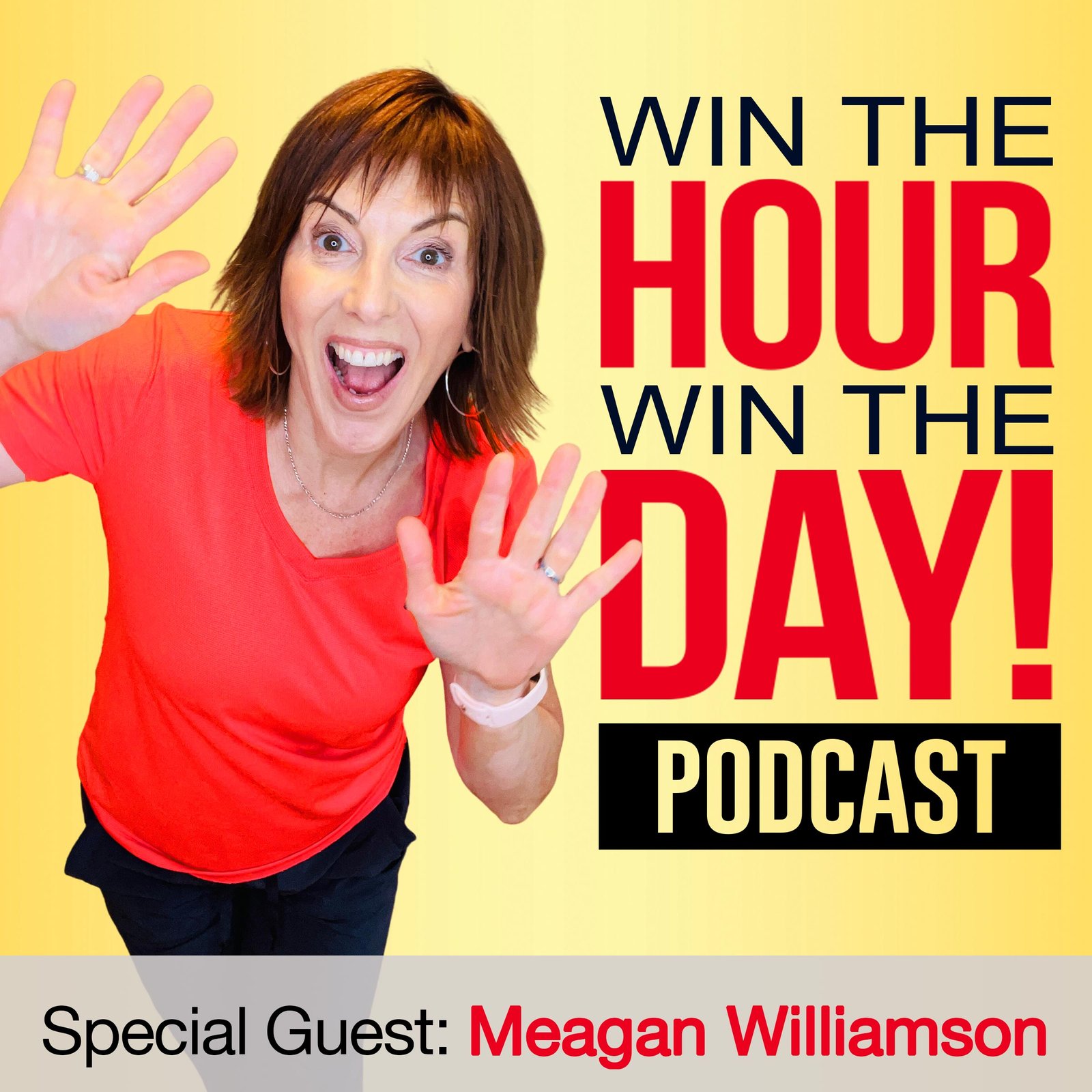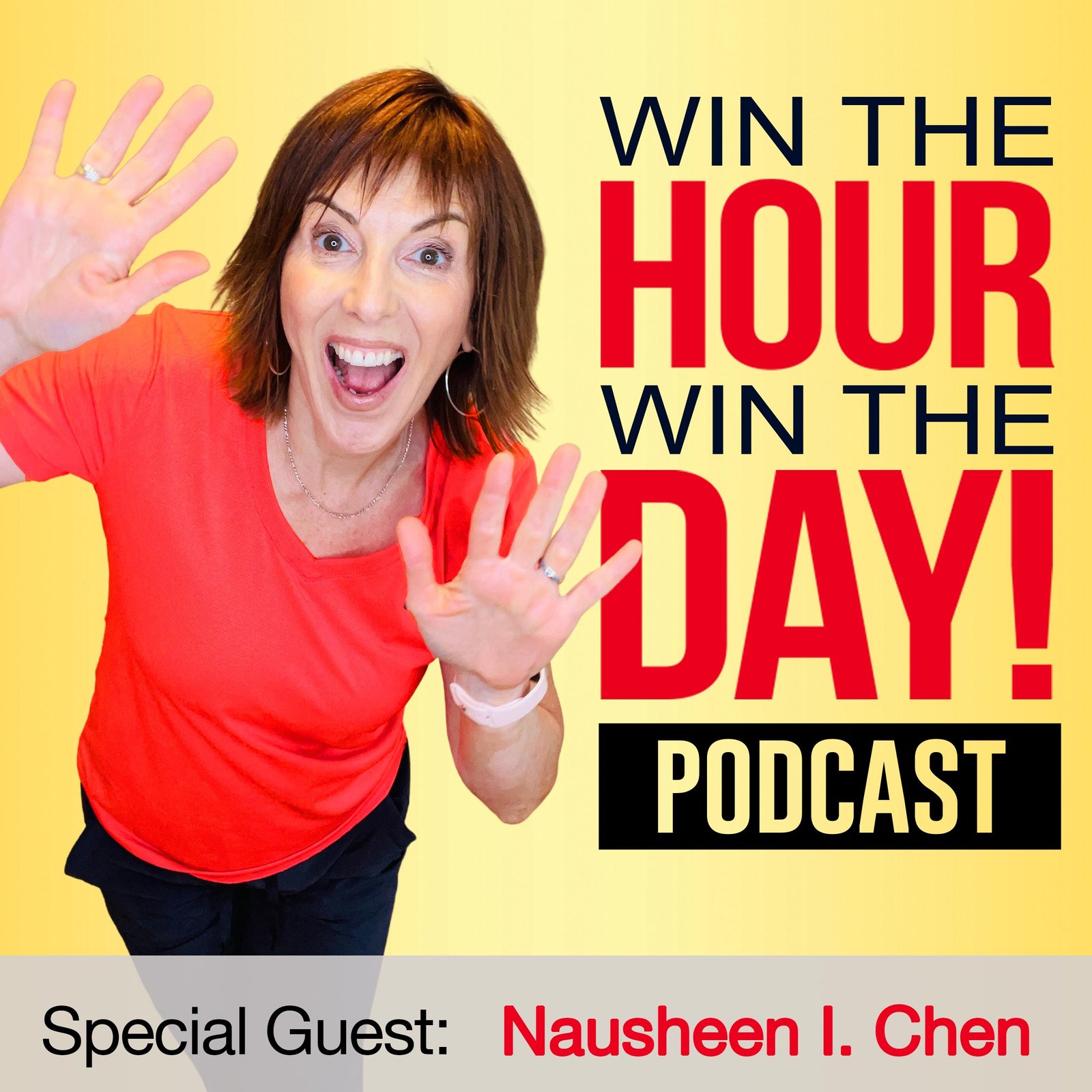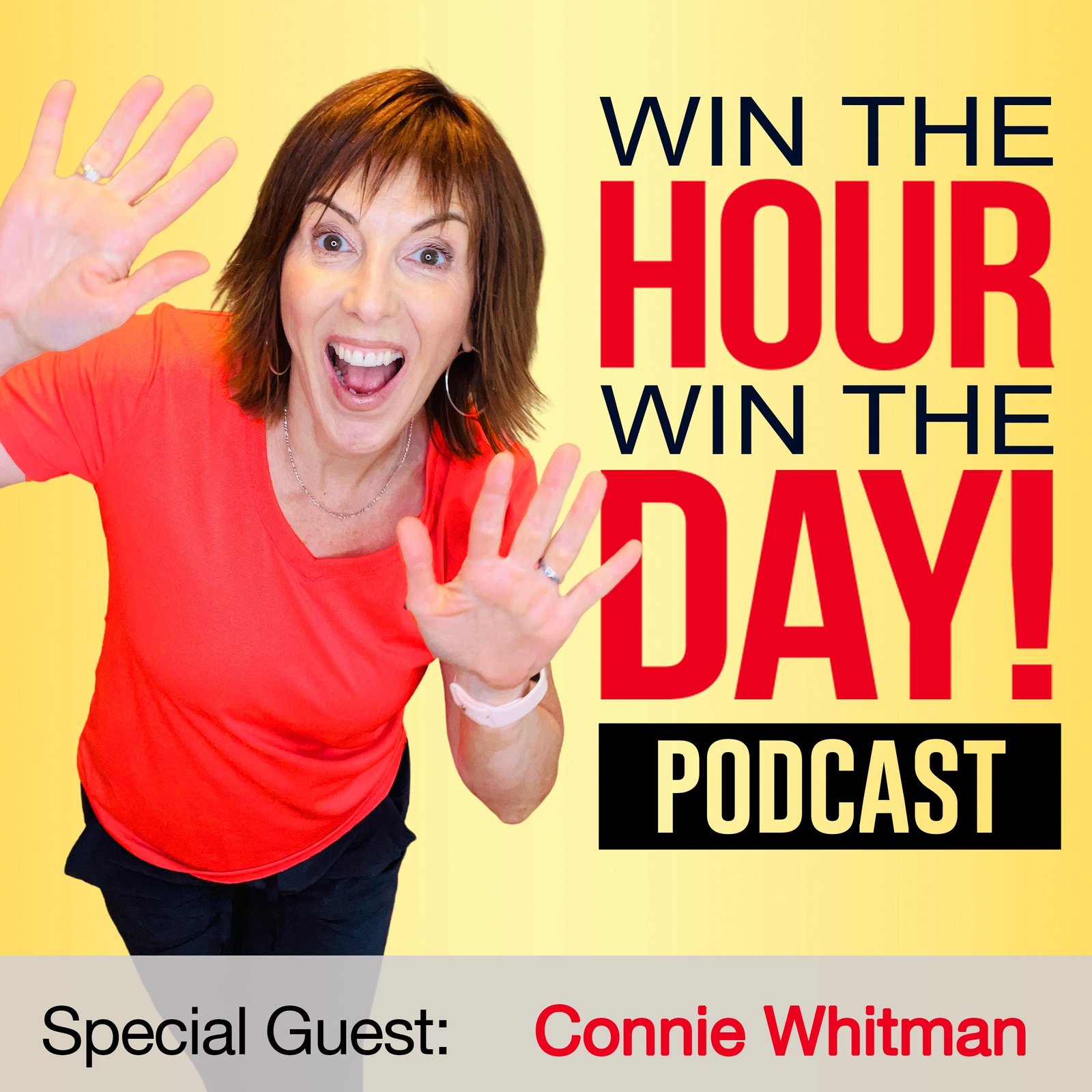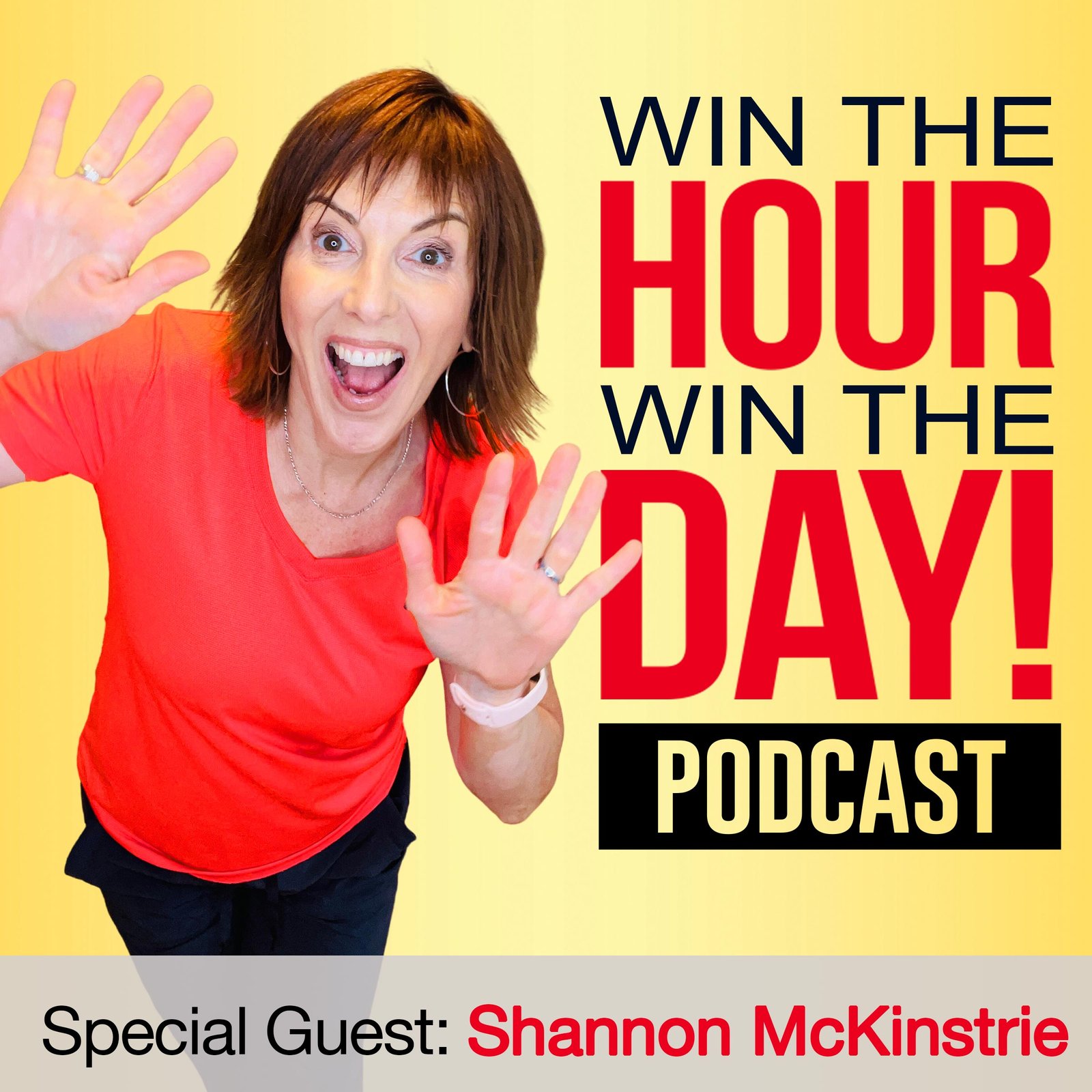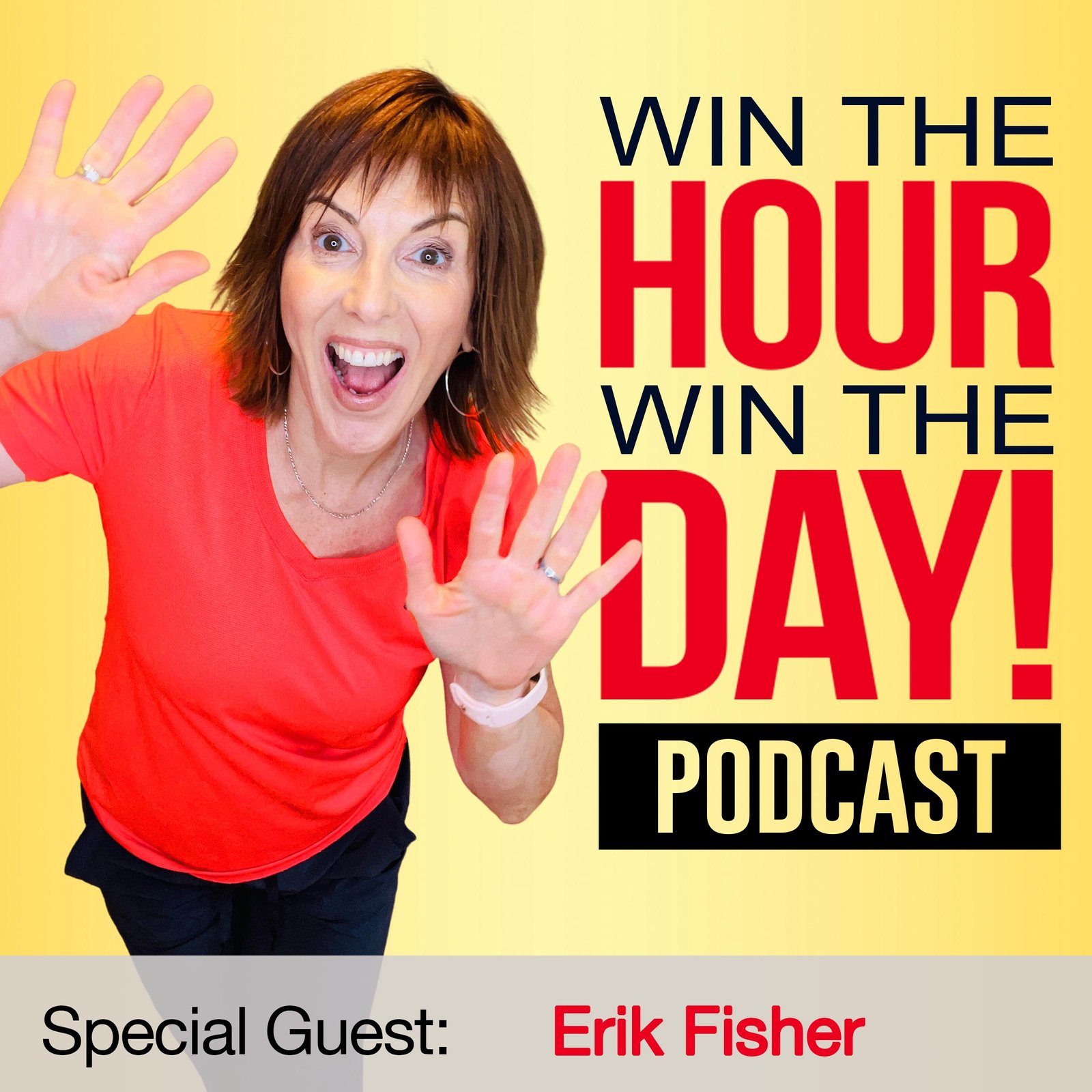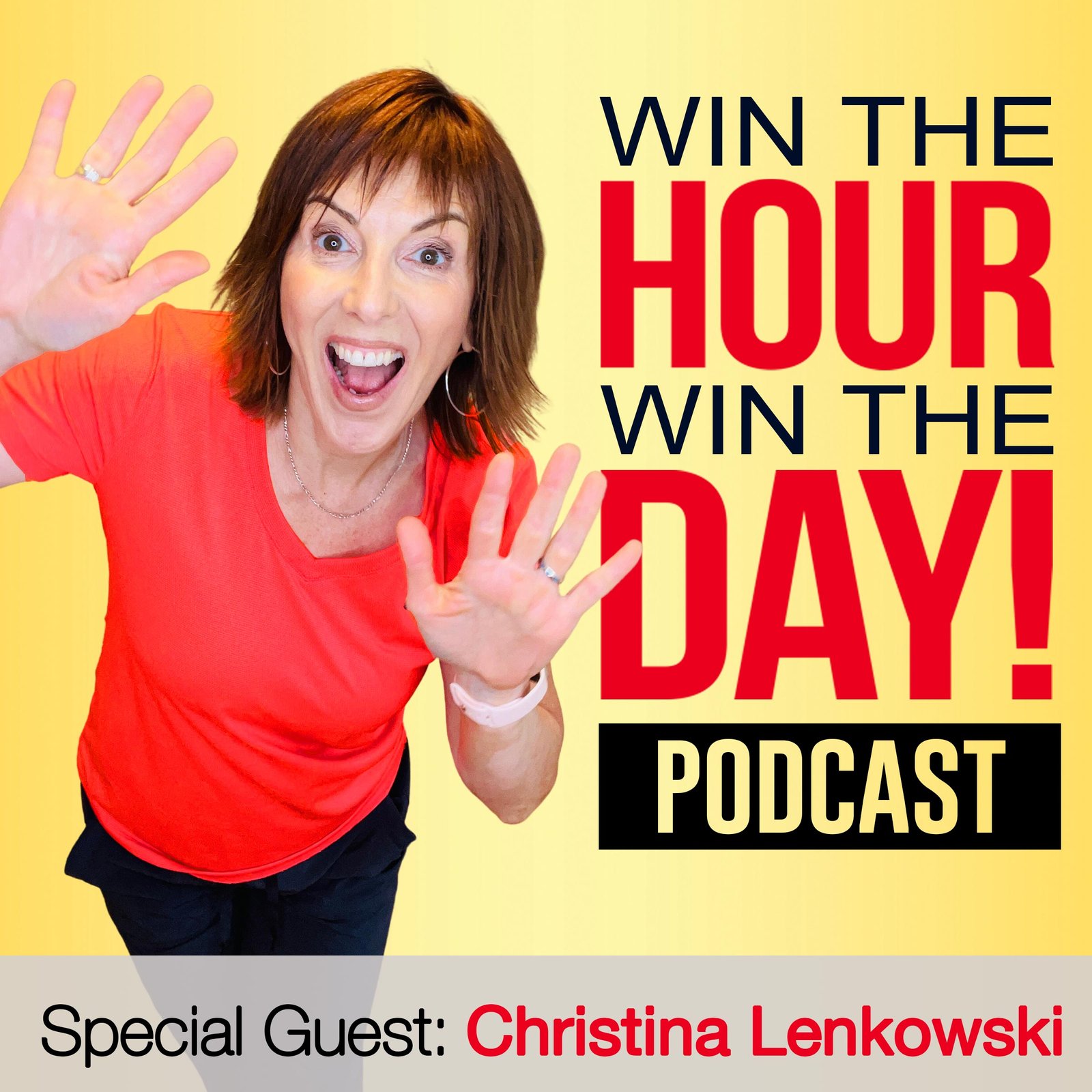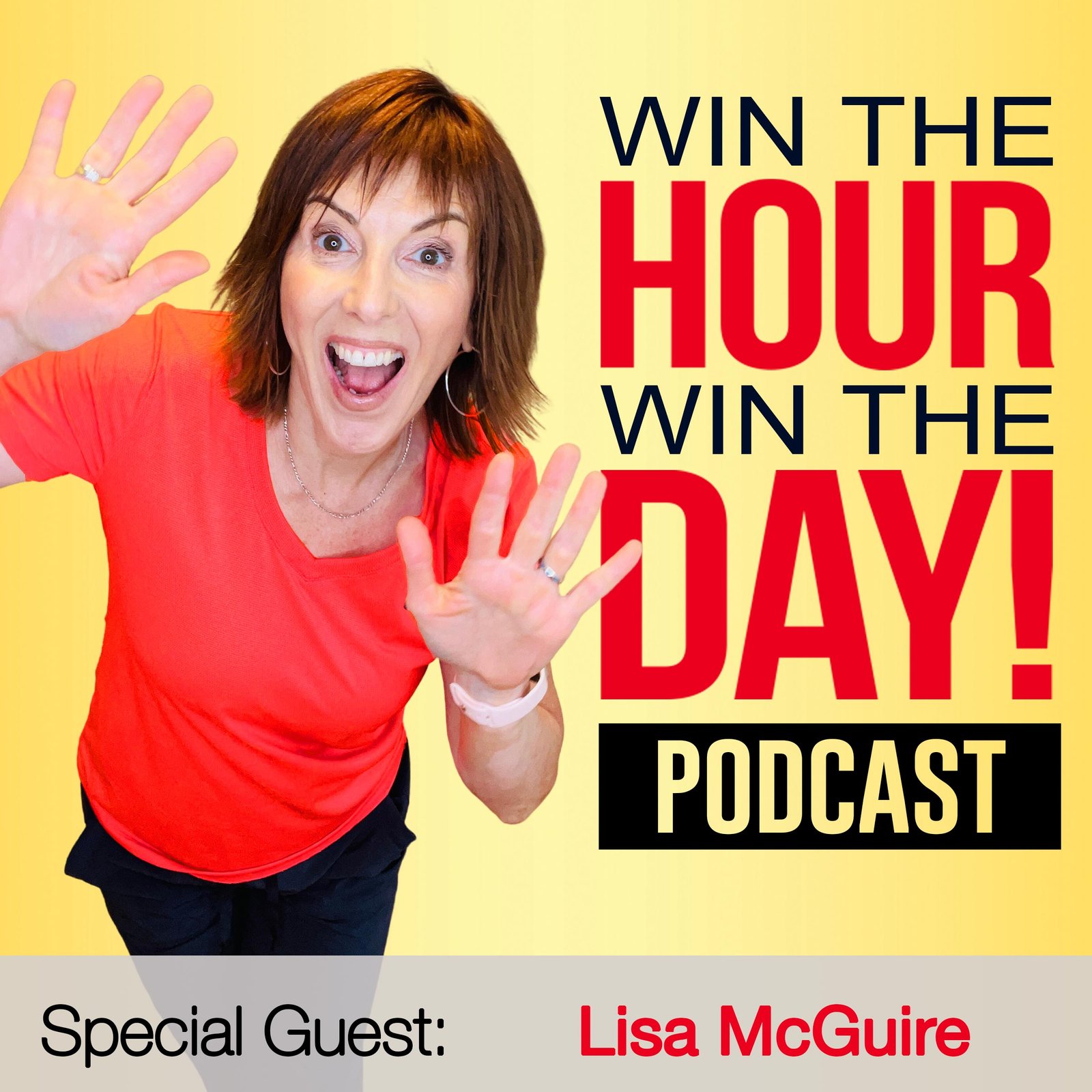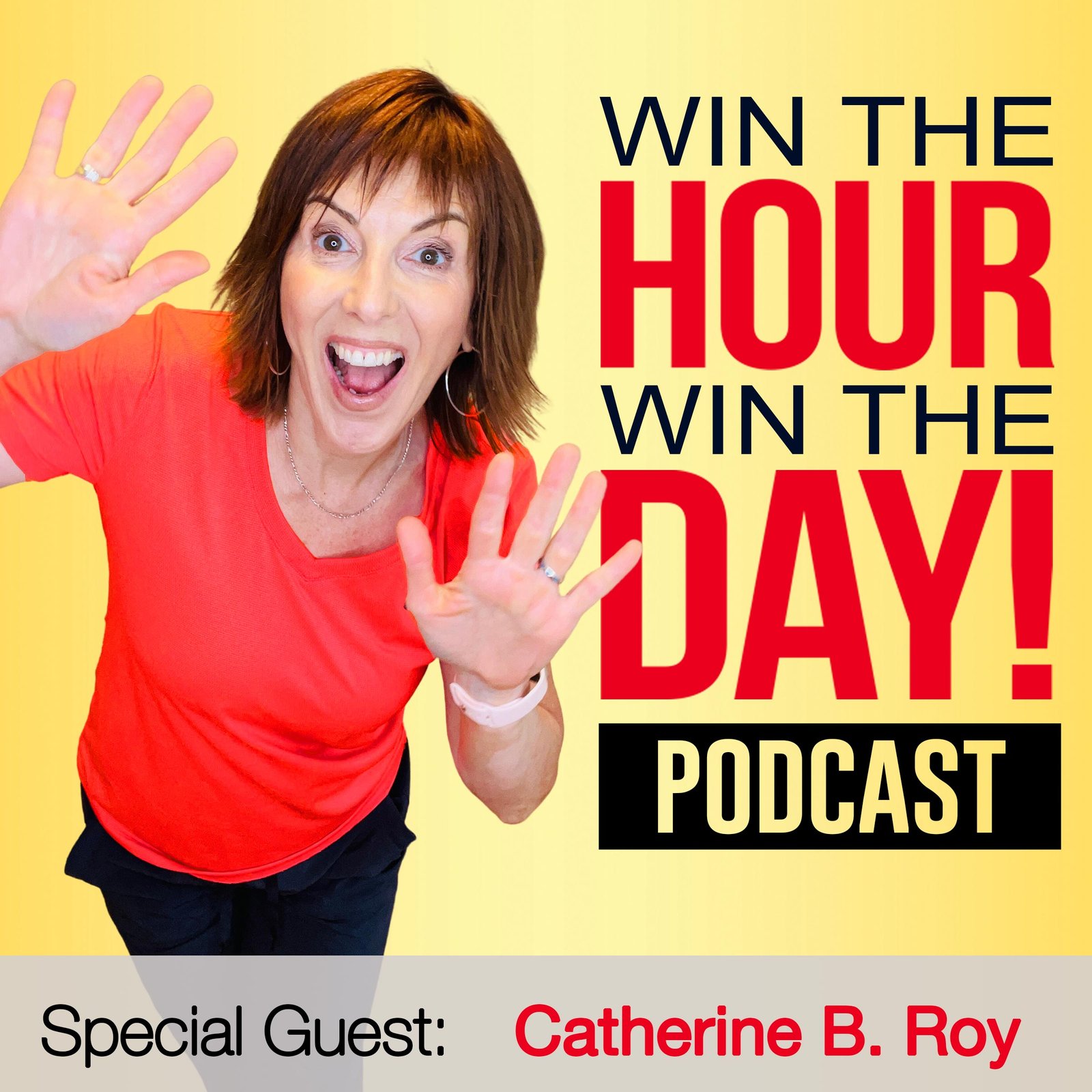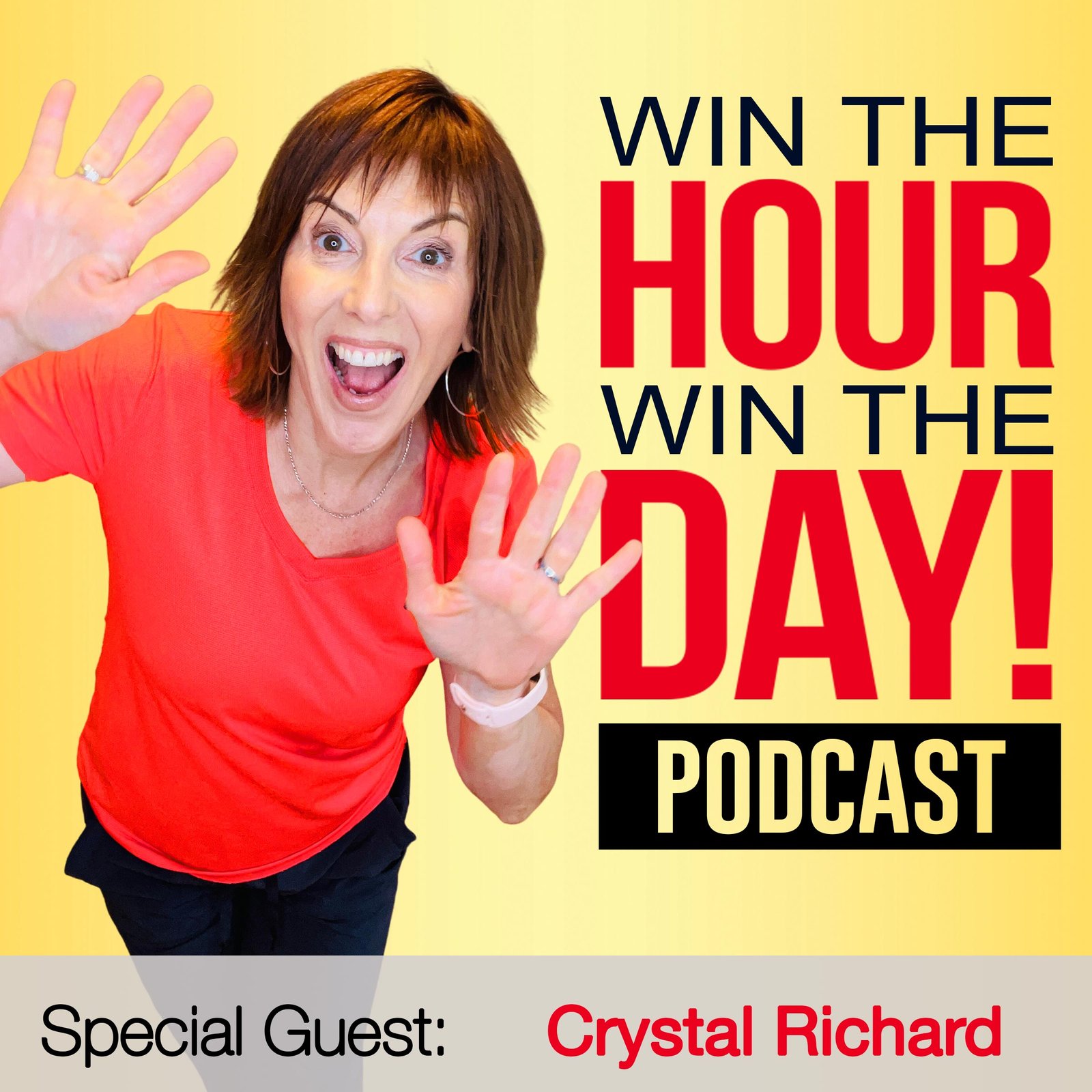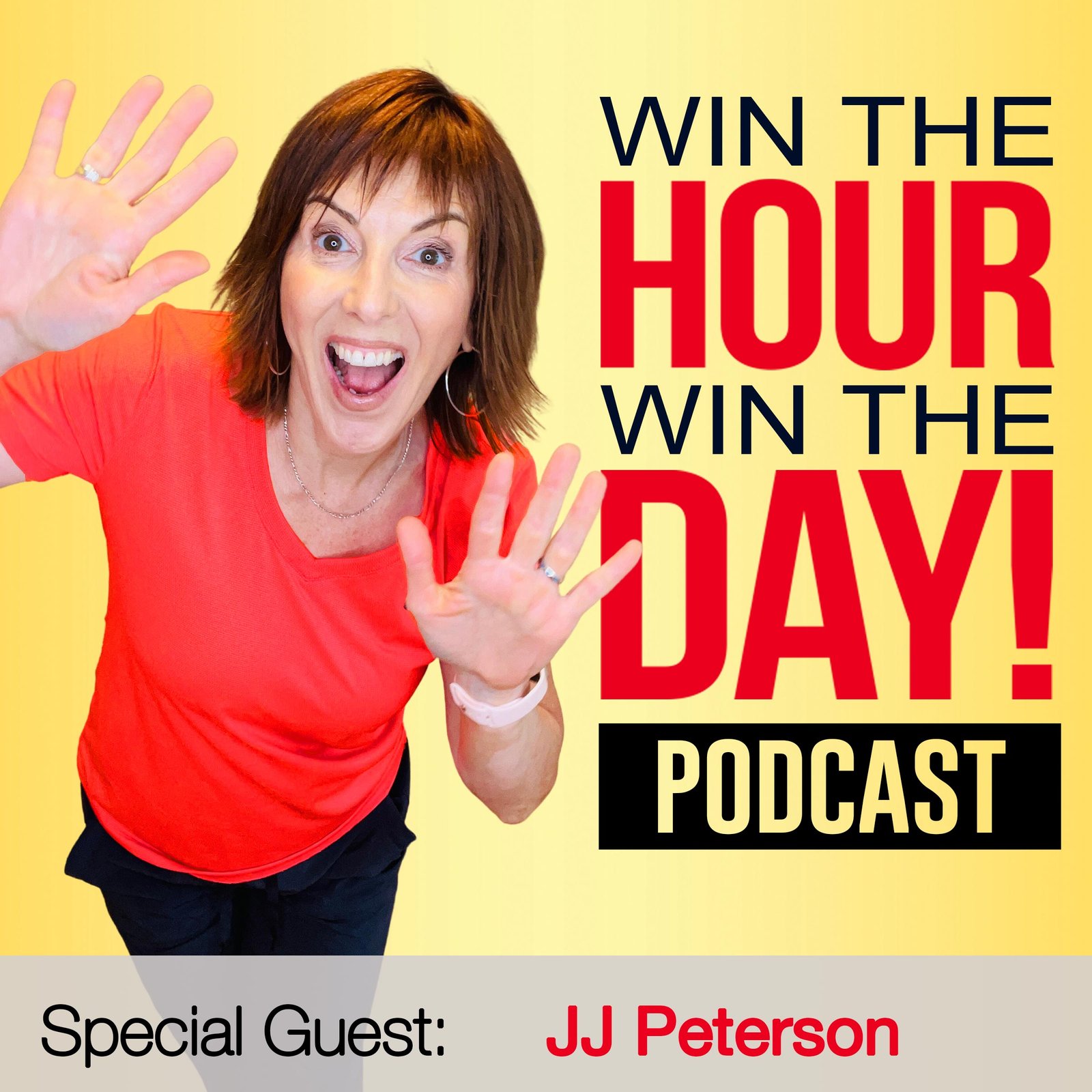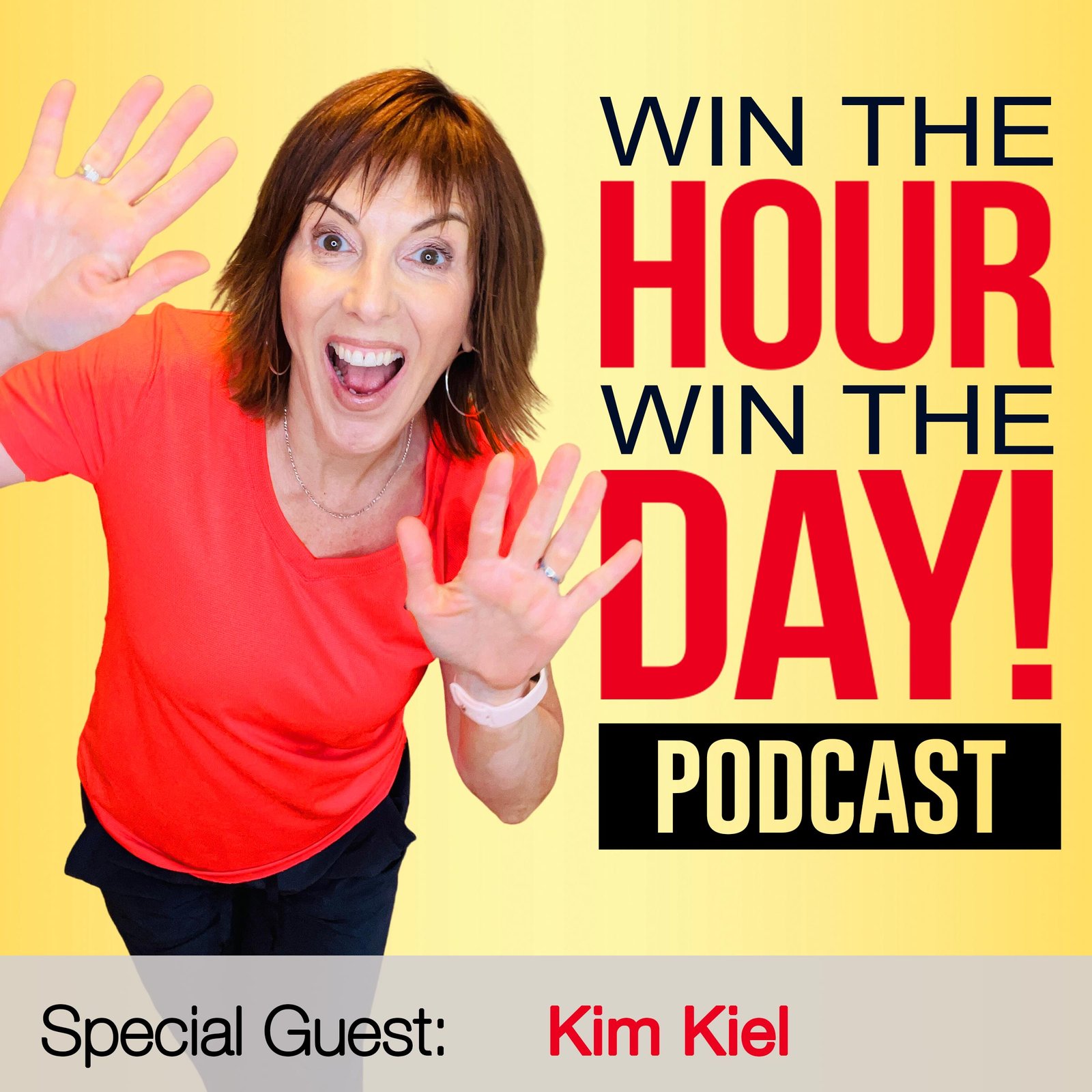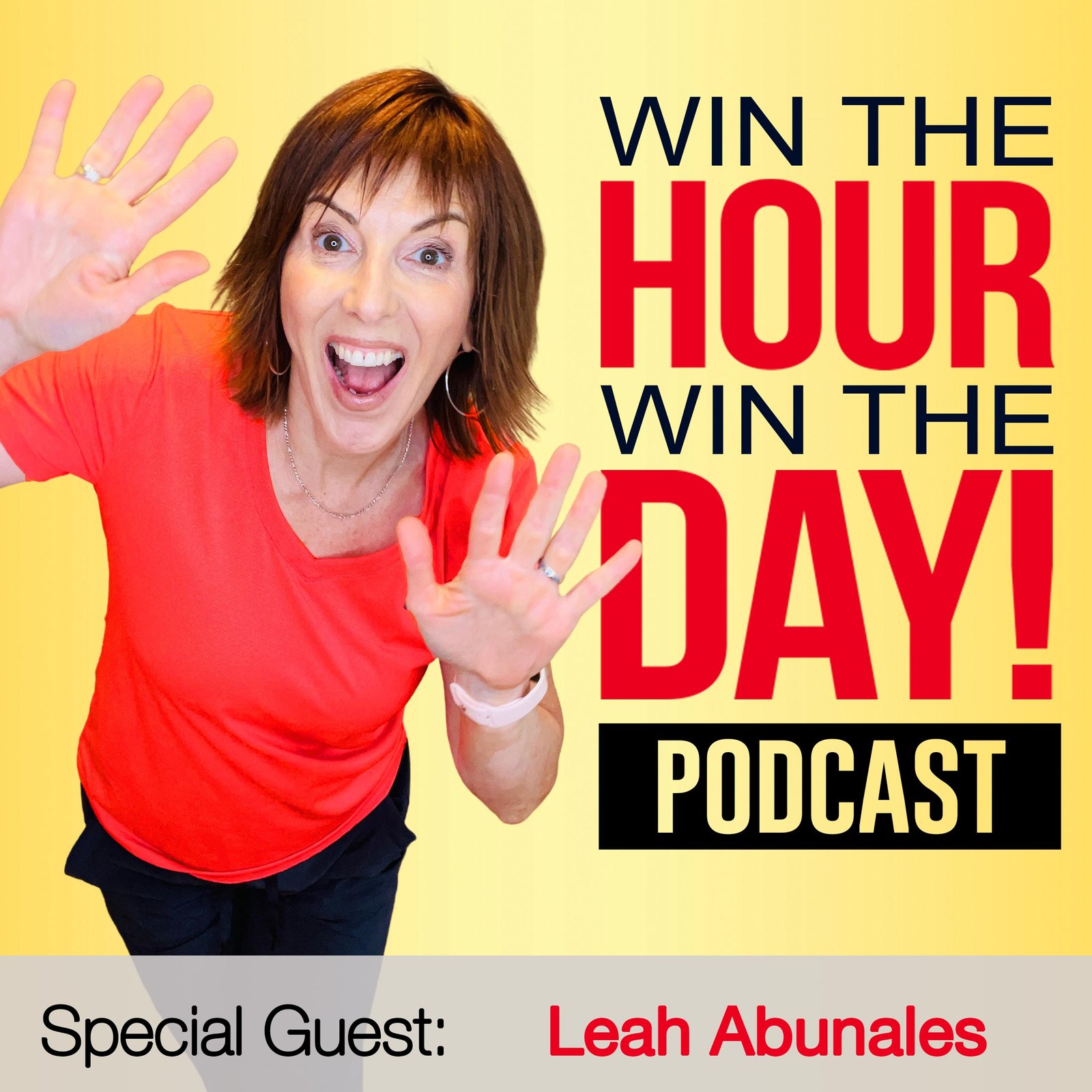Episode Summary This week’s episode of Win The Hour, Win The Day Podcast is...
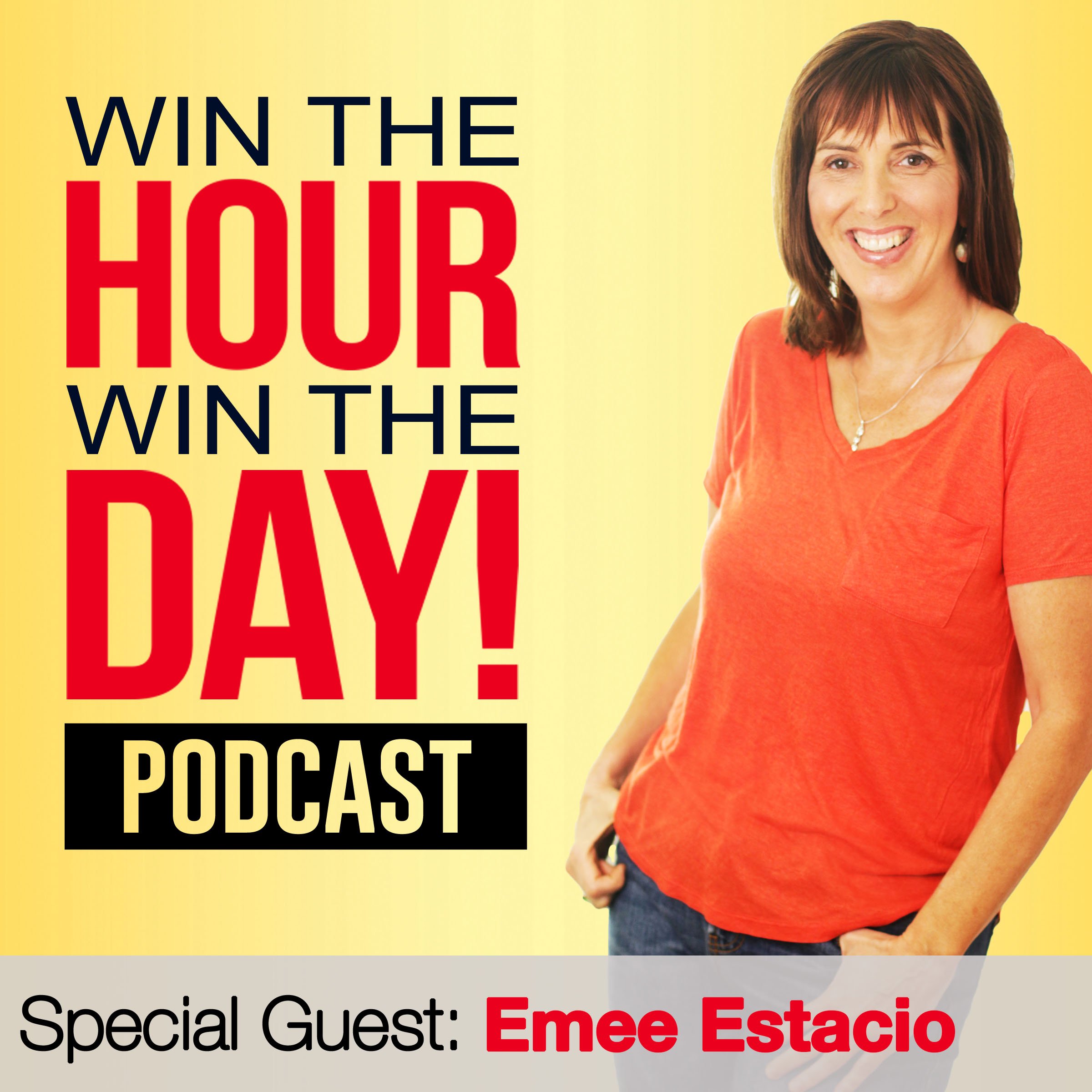
Are You Ready For Your Next Big Win?
Know your entrepreneur personality and I’ll take it from there!
Recent Podcast Episodes
Preventing Burnout with Smart Work Tools! with Kris Ward
Episode Summary This week’s episode of Win The Hour, Win The Day Podcast is...
Master Social Selling: Heidi Medina’s Strategies for Engagement
Episode Summary This week’s episode of Win The Hour, Win The Day Podcast is...
Boost Productivity and Master Storytelling! with AmondaRose Igoe
Episode Summary This week’s episode of Win The Hour, Win The Day Podcast is...
Master Video Marketing: Top Tips for Entrepreneurs with Dan Bennett
Episode Summary This week’s episode of Win The Hour, Win The Day Podcast is...
Boost Your LinkedIn Strategy with AI Tools for Enhanced Productivity! with Joe Apfelbaum
Episode Summary This week’s episode of Win The Hour, Win The Day Podcast is...
Mastering Personal Branding with NLP Techniques! with Olesija Saue
Episode Summary This week’s episode of Win The Hour, Win The Day Podcast is...
Innovative Lead Generation and Email Automation Secrets with Jennie Wright
Episode Summary This week’s episode of Win The Hour, Win The Day Podcast is...
PR Strategies for Diverse Entrepreneurial Impact! with Jennifer Singh
Episode Summary This week’s episode of Win The Hour, Win The Day Podcast is...
Convert More Clients on LinkedIn with Richard Moore
Episode Summary This week’s episode of Win The Hour, Win The Day Podcast is...
Master Business Growth on Pinterest with Meagan Williamson
Episode Summary This week’s episode of Win The Hour, Win The Day Podcast is...
24/7 Sales Boost: Video Marketing Secrets with Alex Sheridan
Episode Summary This week’s episode of Win The Hour, Win The Day Podcast is...
Master Public Speaking Tips with Nausheen Chen!
Episode Summary This week’s episode of Win The Hour, Win The Day Podcast is...
Beating The Burnout With Connie Whitman’s Success Story
Episode Summary This week’s episode of Win The Hour, Win The Day Podcast interviews,...
Craft Your Social Media Content Strategy With Shannon McKinstrie
Episode Summary This week’s episode of Win The Hour, Win The Day Podcast is...
Boost Your Productivity with AI Tools: A Deep Dive with Erik Fisher
Episode Summary This week’s episode of Win The Hour, Win The Day Podcast is...
Boost Visibility: Repurpose Content and Leverage Podcasts With Christina Lenkowski
Episode Summary This week’s episode of Win The Hour, Win The Day Podcast is...
Master Personal Branding & Storytelling with Lisa McGuire
Episode Summary This week’s episode of Win The Hour, Win The Day Podcast is...
Boost Business on LinkedIn with Catherine B. Roy’s Strategies
Episode Summary This week’s episode of Win The Hour, Win The Day Podcast is...
Scale Your Business: Optimizing Virtual Assistant Services with Kris Ward & Rachel Eubanks
Episode Summary This week’s episode of Win The Hour, Win The Day Podcast is...
Affordable PR Mastery: Crystal Richard Unveils Modern Techniques
Episode Summary This week’s episode of Win The Hour, Win The Day Podcast is...
Mastering Business Storytelling with JJ Peterson’s Guide
Episode Summary This week’s episode of Win The Hour, Win The Day Podcast is...
Revamp Your About Page: Guide to Personal Branding
Episode Summary This week’s episode of Win The Hour, Win The Day Podcast is...
LinkedIn Mastery and Video Marketing Secrets with Alex Sheridan
Episode Summary This week’s episode of Win The Hour, Win The Day Podcast interviews,...
The Systems and Processes Playbook: Insider Secrets to Streamlining Your Small Business with Leah Abunales
Episode Summary This week’s episode of Win The Hour, Win The Day Podcast interviews,...
How You’re More Of An Expert Than You Realize! With Emee Estacio
Episode Summary
Every Entrepreneur has a story and this one is no different! Today’s guest went from being a life long psychologist to becoming an entrepreneur herself! Coming from the academic world that was all about structure- learn how Emee found her way and how it can benefit you! It’s an interesting journey with some great insights.
Learn how:
-You have expertise that can help others
-To deliver that expertise so it can have a meaningful impact
-And why you are obliged to share your knowledge!
Join The Community: https://www.facebook.com/groups/WinTheHourWinTheDay/
Win The Hour, Win The Day! www.winthehourwintheday.com
Podcast: Win The Hour, Win The Day Podcast
Facebook: https://www.facebook.com/winthehourwintheday/
LinkedIn: https://www.linkedin.com/company/win-the-hour-win-the-day-podcast
You can find Emee at:
Facebook Group: Self publishing made simple community
The Get It Done Challenge (starts 15th January 2020)
Website: https://thepamecode.com/
Instagram: @emee_estacio
LinkedIn: https://www.linkedin.com/in/emeevida/
Emee Vida Estacio – NYB Podcast – Transcription
LEGEND:
GREEN – best lines of the guest
CYAN – Links to the guest business
YELLOW – Introduction of the guest
RED – opening teaser
Kris: (06:15)
This is now your business and I’m Kris Ward. I am excited to have our next guest. Today we have Dr Emee Vida, Estacio and she is a chartered psychologist, author, keynote speaker, life transformation and leadership coach. Her passion is to help ambitious entrepreneurs and professionals overcome their limiting beliefs so they can power through to their next level. She has over 20 years experience. She must have started really young because you’ve got to see her people. She’s experienced in psychology and and has established herself as a world renowned expert in the field. She is the bestselling author of the psychology in your life series, including titles such as the imposter syndrome, REM remedy, change your life for good and fear is not my enemy and she’s now helping inspiring individuals fulfill their lifelong ambition to write and publish their own books. Emee, welcome to the show. I’m so glad you’re here.
Emee: (07:20)
I’m so excited to be here, Kris. Thanks for inviting me. Such an honor.
Kris: (07:25)
well that’s a long list of accomplishments. So let’s dive right in and why don’t you tell us a little bit, if you could in a minute or so, it’d be your backstory and sort of how, how did this unfold for you?
Emee: (07:37)
Sure. Well, as, as you’ve read, I’m actually, my background is in psychology, but that’s not really my original plan. Um, you were right when you said they started early. Um, I started when I was 15, and the original plan was for me to become a medical doctor. I got into med school, but because I was 15 at that time, my mom said, uh, you know, you’re probably too young, um, to go into med school. Maybe you should, um, study psychology as a premed and after the four years, if you still want to be a doctor, carry on and be a medical doctor. So I followed her advice, studied psychology, and after four years, I loved it so much that I forgot about med school and just pursued a career in psychology. I moved to London, did my masters, my PhD here in, in London, and I became an academic. And for the past 20 years I’ve had this, um, reputation, this, this academic, um, reputation in health and community psychology, university lecturer, researcher. But at the same time I felt as if I wasn’t really doing enough, I wasn’t reaching enough people and making a big impact with my academic hat on. So I thought if I really wanted to make the most out of my skills and make psychology useful to the masses, then I need to step out of academia and bring psychology to the masses. And that’s how I came about writing my psychology and your life series, showing how we can use psychology to overcome our sense of, um, incompetence, our fears, our anxiety, so we can actually use psychology so to, to unleash our potential and make the most out of our lives. So in a nutshell, that’s where I am
Kris: (09:27)
in a nutshell. Okay. So let’s start off and let’s just be clear that I have very little ability to relate to you as a 15 year old. So I assure you I was not sitting down with my mom at 15 going, well you know, I know you really want to go into med school and you’ve got the grades for it and you’ve been accepted, but I think you’re a little too young. This was not the conversation around my kitchen table. So let’s establish that we’re not going to connect on that level. But what happened after that journey is, yeah, so then you turn this, which is always very interesting. Then you turn this academia background, which you know what, that’s a whole discussion. You know, we could dive into, cause I find for myself too, we’ve talked about this in a number of times in the show. We social media showing up with your academic armor on or trying to sound professional and, and for getting disturbed. Uh, sorta drop your guard and just be engaging and just be fun or casual Chris or somebody that you would chat with and have a coffee with. So it is interesting that we all have some, a level of academia that, you know, limits us or wears us down. But yours is, you really got a lot there. So then you took that and went to be an entrepreneur.
Emee: (10:38)
That’s correct.
Kris: (10:40)
Tell us about that. What, what, what was that journey like?
Emee: (10:43)
Yes. It was just that realization when, when I had my first baby, um, it made me, me, it made me feel as if I’m not really making the most out of my skills. I’m not reaching enough people. And my time here on earth is limited. My time to be with my son as well is limited with him as a child. So for me to be in academia within the four walls of academia, I felt it was limiting that I could do more outside of academia. And even if academia was my comfort zone, you know, I’ve been in it for 20 years to step out of it because I wanted more out of my life and reach out to more people and make use of psychology to help more people. I think that was a big step for me. That was a huge leap for me. And I have to say that it took a lot of courage, um, to do that.
Kris: (11:38)
I would think so too, because you’re surrounded by like minded people. And so they probably didn’t understand this foreign talk and this foolishness. I know when I quit my job to start my business and you know, people were me here. I was, I don’t know, I can’t even remember, I guess 30 or something. And people were saying to me, Oh my gosh, like you’re going to give up a really amazing pension, which by the way is 30 years down the road. So they were telling me I shouldn’t stick it out till I’m 65 and start my life at 65 which I, I, Hey, I don’t think 60 fives old. You can start, you can always start over. But I don’t think you should wait 30 plus years. Right. So not judging the age, but I’m judging the waiting 30 years does not seem like a real modern game plan. So boy, boy, you must have had to sort of look at a lot of raising our eyebrows.
Emee: (12:35)
Oh yes. Certainly. And for a lot of my previous colleagues, they were telling me, Oh, you know, this is all we know. We spent all our lives getting to where we are. You, you, you know, you’ve studied, um, you know, you did, uh, your, your undergrad, your postgrad, your PhD, postdoc and so on. Only to throw it all away. Well, for me it’s not that I’m throwing it all the way, all the skills and the experience and expertise that I gained throughout my career as a, as an academic, I’m taking them with me. The communication skills, the ability to, to structure my workload, the ability to communicate and everything that I know about psychology, I’m taking it with me now as an entrepreneur and bringing psychology to the masses. And that’s what I’ve been trying to do with my books. Psychology in your life series. And I’ve self published my books. Even if I have a traditional publisher, I could publish my books with a publisher, but I chose the self publishing route because I have more freedom and autonomy and control over what I write and how I write it and how I market it and how I’m going to reach my audience and you know, with my message.
Kris: (13:45)
So you wanted freedom of choice. You wanted to get out there and you want it to be more creative and have some free, you know, some options now. Boy. So this is really interesting. So with all your professional background, your business is still relatively new in comparison. So tell me some of the pain points. What, you know, why was it you went, okay, Oh my gosh, I’ll learn how to do this now or I have to change what I’m doing now. What were your now moments?
Emee: (14:10)
My pain points for now, to be perfectly honest with you, I still feel excited. You know, I left over a year ago and I started my business even while I was still working in my job butt.
Kris: (14:22)
Right?
Emee: (14:23)
I feel excited. You know, I still feel the energy and the prospect of the future, but when it comes to the pain points, I have to say that I do miss having a routine, like knowing exactly what’s going to happen next. Because as a new entrepreneur there are a lot of unknown unknowns. There’s a lot of learning, a lot of growth, a lot of development. So my routine is still quite flexible, unlike for the past 20 years. I know that I’m teaching on a Monday morning from nine to 10 o’clock and then I have a bunch of meetings. You know what I mean? So the structure, I’m still building a structure. I’m still learning how things work. But my, Oh my, it’s so exciting. I love doing that. Anyway, you know, finding my feet, I’m creating my routine as I go along. There’s a lot of room for, for growth and development. You can see it as a pain point. But I see it as a, as an exciting new time to, to build my schedule, to build my routine because now I have the, the freedom and flexibility to do that.
Kris: (15:27)
Well that is amazing. I have to tell you, I’ve had my marketing agency for over 10 years and I deal get excited and one of my issues is I’ve always struggled with sleep and I wake up and I think, is it time to get up yet? And it’s only like, you know, four 14 or something. Okay, okay, fuck you, focus, go back to sleep. So I think if you love what you do, it never gets old because I’m always excited about something new that’s happening. Whatever. So, all right. So tell us a little bit about the type of people that you work with and what is it that you know you’re bringing to the table and what are you excited about the lives that you’re working with?
Emee: (16:03)
Sure. Well, I’m currently working now with, with inspiring individuals who want to share their, their stories and their expertise and become a best selling author on Amazon. Some of them, they started off as coaching clients and they realize, Oh my goodness, you have so much to share to the world. So much, um, life experience to be told. And the only thing that’s holding them back from writing their books is the self doubt that I’m not good enough to write a book or I’m not expert enough to write something about this. When in fact they’ve been doing what they’ve been doing for 30 plus years and they’re still thinking, Oh, you know, I, I’m not sure if I can do this. So I, I, I do love engaging with these individuals, you know, bringing them out of their shells and making them realize that they hold, um, expert knowledge and life experience that other people could benefit from and helping them to realize that it’s absolutely fantastic.
Kris: (17:02)
Yeah. Let me jump in there because you know, a lot of our listeners are not going to have 30 years experience and you’re telling us your clients, Oh my gosh, I’ve got 30 years experience is still not enough. I know when I wrote my book, when the hour when the day somebody talked me into writing that too because I don’t know what you’re waiting for, but you, you think that you need somebody, I don’t know, to come and tap you on the head with a wand and say you’ve been blessed. It’s time for you to share your message with the masses. And I mean I had been in business for over 10 years in my book is written on the growing pains of working too hard, grinding it out and that business should be fun. It doesn’t have to be that hard. But I too thought, well, maybe when I reach $1 million or maybe when I don’t know what maybe my hair needs to be. Certainly, I don’t know what, I was waiting for some magical time where you felt blessed and, and a fairy came and said, this is the time. So that’s a really important message is we, everybody does have a book in them. You just gotta get it out right. If that’s your passion, if that’s your passion. It’s not a matter of if the timing is right. The timing is now, whenever the timing is right now,
Emee: (18:07)
the timing is now. But I have to say though, Chris, um, from what I’ve seen from my, from my clients, I have a current client, he’s a beekeeper and he’s been a beekeeper, tinker for 35 years. Like, you know, ask him anything about beekeeping. And he could go on and on and on and on about these. But when, when we first met, he said, I don’t think I can write a book because I’m just not a writer. And I told him, look, this is a limiting belief that you need to be a brilliant writer in order to share what you know. Um, so I just asked him a couple of questions about beekeeping and he just went on and on and on and on about it. They said, well, there you go. That’s your book. You know, you’re basically telling people how to be safe. Um, you know, what sort of equipment they need when they start their beekeeping as a hobby or as a business. Um, what do they need to, to look for, you know, in terms of the season, in a, what do they need to prepare?
Kris: (19:06)
How not to get sting on.
Emee: (19:06)
And he just, exactly, exactly. So he knew it inside out and just having that other person talk you through your ideas and you realize that, Oh my goodness, I actually do know a lot. And this ties in with my, one of my books, imposter syndrome remedy. So many of us have this feeling of incompetence and inadequacy. Even if we are good at what we do. You know, some of the things that we do best, we think that they are easy for everyone. You know, just because you are good at it doesn’t mean that it’s easy for everyone. You are good at it because you learned how to do it because you had years of experience doing it. You learn from mistakes. You know, it’s, it’s a matter of learning and growing. And just because it is easy for you, it doesn’t mean it’s easy for everyone. And so if you have that expert knowledge, um, if you have a life experience, for example, that you overcame and if you want to share that with, with other people, knowing that what you know could help them and what’s holding you back, you know, you, you don’t have to keep your expertise and your insights to yourself, you have the obligation to share it with other people, especially if you know, if it’s going to help someone else.
Kris: (20:23)
Yeah. And I think what happens is when you love what you do, you’re always looking at, like for me, I’m always looking at the next single, I want to get better at this and better that. So I think that even when it comes easy to you think because you’re so hungry to get better and better at your craft, that you’re not there yet. You’re not there yet. And so then you think you, you know, the book’s not ready. And I know too, when people think they’re not a good writer. I remember my editor when she was going through my book and she kept saying, I need to take down. Like even things like cannot, she’d say, you have to say, can’t do. You have to talk like you’re, you know, you can’t be writing gotta be talking. And so I’m like, I went to college and university and all these things to learn, you know, to be all growed up and have an education and now you’re telling me to dumb it down, not dumb it down. Let me rephrase that. That’s wrong. You’re telling me to simplify the language to the language that I had in grade eight. Um, so you’re right, you don’t need to be a writer. In fact, more and more you need to be a good talker. I know from my book people keep telling me it’s easy read and that’s the biggest compliment that you know, it’s digestible so it doesn’t have to be a crafted story kind of thing.
Emee: (21:27)
Absolutely. And one of the things that they tell my students as well as when you write the book, it’s not always about showing off what you know. You need to understand who you are writing for and you are writing based on what your, what your readers need right now. You don’t have to do a brain dump and put everything that you know on a page that’s not going to make sense. You need to understand what your readers need, what they are looking for, what are their pain points and what parts of your expertise, what parts of your knowledge you can put on your book so you can serve and, and you know, help those readers that need your, um, knowledge. Right now. So that’s another thing. Um, when you are thinking about writing and publishing your book, remember it’s not just about you, it’s about your readers and understanding how you can serve them with what you know and, and delivering a book that will, that will help them, um, in some way.
Kris: (22:25)
Yeah, absolutely. Okay, so let’s talk about your clients. You know, you’re dealing with, you’re new at entrepreneurship yourself and now you’re out there and you’re helping other, mostly these are entrepreneurs, right? So you’re a new homeowner, coaches, entrepreneurs, you know, get business owners who have lots of experience in what they do but not necessarily in the writing and publishing side of what they, what they’re working on. Gotcha. So I think too, this is a really great example where again, you know, as far as being an entrepreneur, you’re not like crazy ahead of them. You come with all your experience but you’re not crazy years and years ahead of them. So I think it’s really great for people to understand. Like, we always think there is some of this creditation that you, in order to coach others, you have to have years and years of experience. So what kind of person comes to you?
Emee: (23:19)
Oh, right. So the, the types of, um, people that that come to me right now, they are people who are doing extremely well in their businesses. Um, they want to reach out, um, to more audiences, you know, to share what they know, but it’s just that they don’t know where to start when it comes to writing and publishing their work. They know that, um, having a book has this potential, um, to, to their brand, to share their, um, to share their message, you know, to share what they know, leave a lasting legacy. For example, many of my clients, um, they, they, they are in their sixties, uh, and they lived a really colorful life and they, they want to share what they’ve learned in their lives, um, before they pass on what they have. They still have a lot of time, but they want to do it now before, you know, before, um, before it’s too late. And, and from what they’ve seen is that they have, um, this burning desire to, to serve, you know, to want to share their message because they know that what they have in their heads, you know, their, their expertise in their experience can help other people for most, they are also entrepreneurs. Yeah. Who just really understand the power of, of having a book and how it can set, um, your reputation as an expert in your field. So it’s not only a way to, to share their message, but it’s also to, to build their brand, you know, build their mailing list and let a wider audience know who they are and what they do and how they can serve them. So that’s quite a mix of, of clients that they have right now.
Kris: (24:58)
Yeah. So it’s another tool, uh, having a book as another tool in, in your ability to reach out. I have a bigger impact on your audience. It’s another way to open doors and get in kind of deal. So speaking of books, what kind of books do you recommend to your clients? Like [inaudible], you’re talking to them about books and you want them to write a book, tell us as a new entrepreneur tells about some of the books you’ve eaten up and that you’ve enjoyed.
Emee: (25:22)
Not that I’m being biased here, Chris, in that, because this is your podcast, I’m not lying to you. I actually recommend when the hour, when the day to most of my clients because the thing is most of them, they feel slightly overwhelmed. Um, when it comes to writing and publishing a book, you know, there are a lot of steps that you need to do, but with your book you actually, um, recommend the having them in, in bite sized chunks, you know, just really understanding what you are going to do on that hour and get that task done on that hour. So yeah, when the hour, when the day highly recommended, not just to my clients, but actually to, to everyone who’s, who’s interested in, in managing, you know, really understanding time management. I’m not really even sure if you call it time management but, but really knowing how to make the most of your time and just, you know, having uh, a specific tasks per hour and getting the job done during that hour. Is that clarity?
Kris: (26:24)
Yeah. I mean I call it time management cause I have to, but it is really about time empowerment and I really was interested so thank you for plugging me. You’re awesome. You’re kind. But I do think you’re right. Like you know, I often give the example when I was writing my book because I broke it down. One of the things we talk about in the book is working backwards. And I do think this is really important for entrepreneurs and I say that if we were going out to an event, like say to the dentists Thursday you, you’d say, well okay the dentists at 11 I’ve all of a sudden leave the house at 10 and you realize you have to get up at eight to be at 11 o’clock dental appointment. But when we get work, we just dive into the work. Also excited. We’ve got a new client new project, we’re diving all in. And what I use as the example of writing my book saying, well I worked backwards. I wanted it published at this date. So then when I did the math, it meant five pages per day. So some days I felt like, Oh, I don’t know if I’ve got five pages in me. But because I had it broken down, I realized if I don’t want five pages in me today, I won’t have 10 in me tomorrow. So that really kinda as opposed to somebody else or myself years ago would say, you know what? I don’t feel like it today. I’m going to go really strong. I’ll be fresh on Thursday. It’ll just fly off my fingertips. So you’re right, digesting the pieces of your project I think is hugely important for any entrepreneur. And especially for someone like you again, where you went from a really structured environment and a routine and now you’re making your own. That must’ve been a big transition. Yeah,
Emee: (27:54)
yeah. Yes. And when it comes to two hour course, you know the self publishing made simple course and in the community that we have on Facebook we have the self publishing needs simple community on Facebook. The very first thing that I tell them is if you want to write a book, the first thing that you need to do is to make a conscious decision and commitment to write your book. Because if you’re just wishing that, Oh, you know when, when the time comes I will write my book. It’s, it’s, it’s a wish. But the first thing that you need to do is to make a conscious decision and commitment throughout. Write your book. And I, and, and I encourage all of my members to make that statement in the group that they are going to write and publish their book by. And we have a specific timeframe. So it’s not just a fluffy wish, it’s something concrete with a specific date. When you set the launch date, you work backwards. We have a a starter kit that we have in the self publishing needs, simple community, all of the steps that you need to take from, from doing your market research, building your outline, writing the book, and then preparing it for publishing and launch. Now all the steps are outlined and if you are aiming to finish it, let’s say in 90 days, how are you going to break down those 90 days into hourly chunks and allocate specific tasks in your diary, in your calendar. So when you actually have a look at your calendar, oops, I have to write 500 words in this hour. You know what I mean? So
Kris: (29:27)
I do. And I love hearing you use all my terms. I still would say, and you must work backwards. And by the way, it sounds much more intelligent when you say with your, you know, eloquent little accent there. So that’s awesome. So yeah, I totally get it. And because tell you, there’s a saying where you could go into a graveyard and everybody buried their head and book in them. And I do remember at some point write my book thinking, Oh, now I get that now because without a structure, it really is can quickly become something that you were going to do one day and it never gets done. So boy, you must be a little bit of a task masker to keep all these people on task with writing the book. Like what do you do when they fall off? Like how, what does that look like? How, how do you keep this all together and do all that for them?
Emee: (30:14)
To be honest with you, this is one of my frustrations, um, for the past year because I have my course and I have my group and I have active people who engage in the community, but I still find the accountability. I’m lacking a little bit. People, you know, life happens and they land behind. So what I did instead is I set a 12 week challenge inside the group. They have to make that commitment. During those 12 weeks, we actually start on the 15th of January, 2020 and it’s just a really condensed 12 week period from the 15th of January. I think it transcend until March or April, you know, so it’s, it’s concentrated. We’re not redoing it all at the same time. Week on week and we’ll see how we’ll get on with that because if we, if we just leave it open, you know, people lag behind and it’s quite difficult to manage it in that way. So we’re all doing it together. We can, we having that support and accountability. So we’re all in the same, same boat as well.
Kris: (31:18)
And you don’t want to be in a position to police them all the time, so you have to be able to inspire them without policing them. So. Awesome. Well, Emmy, thank you so much for joining us today. I learned a lot and I think it’s really helpful and it’s really interesting to hear somebody making that leap from an academic world, a structured environment, uh, and to being an entrepreneur. It’s really interesting to take a look at that journey. So where can people find you if they’re looking for you now, where, where can they find you?
Emee: (31:45)
Well, I’m very active on Facebook, so if you can just find our community I’m self-publishing. Made simple. It’s a community of aspiring authors. We’re very warm, supportive and friendly. And with me, with my background in psychology, I always have my psychology hat on, you know, with all this accountability and you know, when, when people feel the fear as well or you know, people might not like my book or um, they’re feeling doubtful about. I’m writing a book. I’m there as a psychologist helping all the aspiring authors to get on with their work, you know, make that conscious decision and commitment to write their books and then we’ll get it done. I’m usually 90 days or less, but the community is called self publishing made simple. It’s all happening on Facebook.
Kris: (32:31)
Awesome. Well thank you again for joining us today, everyone. Another wonderful time with now your business. We will see you in the next episode. This is Kris Ward and thank you for joining us.

